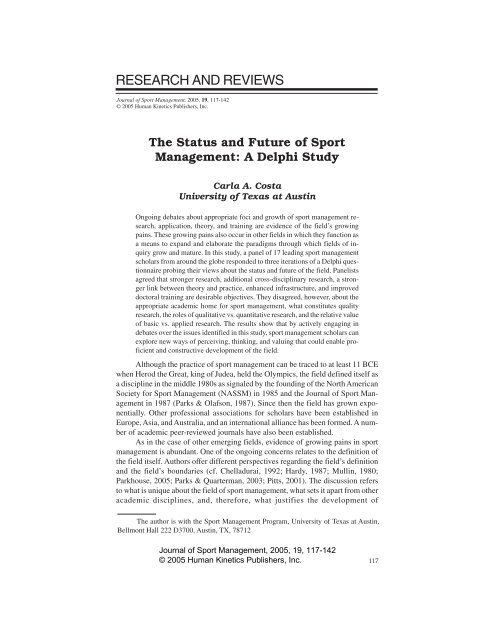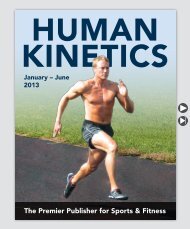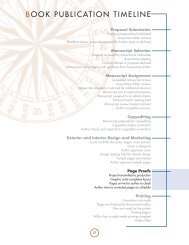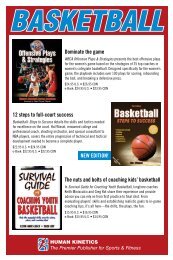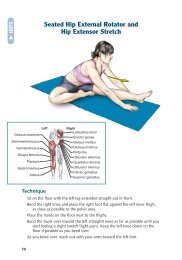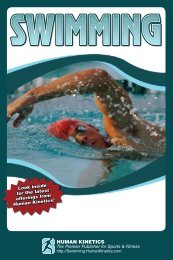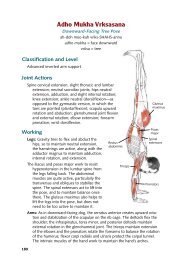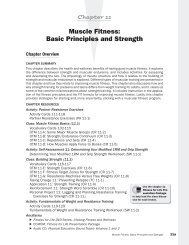The Status and Future of Sport Management - Human Kinetics
The Status and Future of Sport Management - Human Kinetics
The Status and Future of Sport Management - Human Kinetics
Create successful ePaper yourself
Turn your PDF publications into a flip-book with our unique Google optimized e-Paper software.
RESEARCH AND REVIEWS<br />
<strong>Status</strong> <strong>and</strong> <strong>Future</strong> <strong>of</strong> <strong>Sport</strong> <strong>Management</strong> 117<br />
Journal <strong>of</strong> <strong>Sport</strong> <strong>Management</strong>, 2005, 19, 117-142<br />
© 2005 <strong>Human</strong> <strong>Kinetics</strong> Publishers, Inc.<br />
<strong>The</strong> <strong>Status</strong> <strong>and</strong> <strong>Future</strong> <strong>of</strong> <strong>Sport</strong><br />
<strong>Management</strong>: A Delphi Study<br />
Carla A. Costa<br />
University <strong>of</strong> Texas at Austin<br />
Ongoing debates about appropriate foci <strong>and</strong> growth <strong>of</strong> sport management research,<br />
application, theory, <strong>and</strong> training are evidence <strong>of</strong> the field’s growing<br />
pains. <strong>The</strong>se growing pains also occur in other fields in which they function as<br />
a means to exp<strong>and</strong> <strong>and</strong> elaborate the paradigms through which fields <strong>of</strong> inquiry<br />
grow <strong>and</strong> mature. In this study, a panel <strong>of</strong> 17 leading sport management<br />
scholars from around the globe responded to three iterations <strong>of</strong> a Delphi questionnaire<br />
probing their views about the status <strong>and</strong> future <strong>of</strong> the field. Panelists<br />
agreed that stronger research, additional cross-disciplinary research, a stronger<br />
link between theory <strong>and</strong> practice, enhanced infrastructure, <strong>and</strong> improved<br />
doctoral training are desirable objectives. <strong>The</strong>y disagreed, however, about the<br />
appropriate academic home for sport management, what constitutes quality<br />
research, the roles <strong>of</strong> qualitative vs. quantitative research, <strong>and</strong> the relative value<br />
<strong>of</strong> basic vs. applied research. <strong>The</strong> results show that by actively engaging in<br />
debates over the issues identified in this study, sport management scholars can<br />
explore new ways <strong>of</strong> perceiving, thinking, <strong>and</strong> valuing that could enable pr<strong>of</strong>icient<br />
<strong>and</strong> constructive development <strong>of</strong> the field.<br />
Although the practice <strong>of</strong> sport management can be traced to at least 11 BCE<br />
when Herod the Great, king <strong>of</strong> Judea, held the Olympics, the field defined itself as<br />
a discipline in the middle 1980s as signaled by the founding <strong>of</strong> the North American<br />
Society for <strong>Sport</strong> <strong>Management</strong> (NASSM) in 1985 <strong>and</strong> the Journal <strong>of</strong> <strong>Sport</strong> <strong>Management</strong><br />
in 1987 (Parks & Olafson, 1987). Since then the field has grown exponentially.<br />
Other pr<strong>of</strong>essional associations for scholars have been established in<br />
Europe, Asia, <strong>and</strong> Australia, <strong>and</strong> an international alliance has been formed. A number<br />
<strong>of</strong> academic peer-reviewed journals have also been established.<br />
As in the case <strong>of</strong> other emerging fields, evidence <strong>of</strong> growing pains in sport<br />
management is abundant. One <strong>of</strong> the ongoing concerns relates to the definition <strong>of</strong><br />
the field itself. Authors <strong>of</strong>fer different perspectives regarding the field’s definition<br />
<strong>and</strong> the field’s boundaries (cf. Chelladurai, 1992; Hardy, 1987; Mullin, 1980;<br />
Parkhouse, 2005; Parks & Quarterman, 2003; Pitts, 2001). <strong>The</strong> discussion refers<br />
to what is unique about the field <strong>of</strong> sport management, what sets it apart from other<br />
academic disciplines, <strong>and</strong>, therefore, what justifies the development <strong>of</strong><br />
<strong>The</strong> author is with the <strong>Sport</strong> <strong>Management</strong> Program, University <strong>of</strong> Texas at Austin,<br />
Bellmont Hall 222 D3700, Austin, TX, 78712<br />
Journal <strong>of</strong> <strong>Sport</strong> <strong>Management</strong>, 2005, 19, 117-142<br />
© 2005 <strong>Human</strong> <strong>Kinetics</strong> Publishers, Inc.<br />
117
118 Costa<br />
sport management as a distinct discipline. Some authors have questioned whether,<br />
in fact, there is anything unique about sport management at all (e.g., Slack, 1998).<br />
<strong>The</strong>re are also research concerns that present challenges to the field. First,<br />
there is a debate over whether research conducted in sport management should be<br />
mainly practitioner or academically oriented (cf. Boucher, 1998; Chalip, 1997;<br />
Cuneen & Parks, 1997; Slack, 1996; Weese, 1995). Second, concerns have been<br />
expressed regarding both the quality <strong>and</strong> quantity <strong>of</strong> research done in the field<br />
(Boucher, 1998; Frisby, 2005; Mahony & Pitts, 1998; Olafson, 1990, 1995; Parks,<br />
Shewokis, & Costa, 1999). As a result, these researchers differ in their views regarding<br />
the quality, utility, <strong>and</strong> future directions <strong>of</strong> sport management.<br />
<strong>The</strong> differences in perception are both a symptom <strong>and</strong> an outcome <strong>of</strong> the fact<br />
that sport management is still a young discipline. <strong>The</strong>y represent an exploration <strong>of</strong><br />
who we are, where we want to go, how we should get there, <strong>and</strong> where the significant<br />
points <strong>of</strong> disputation reside. <strong>The</strong>se are pivotal realms <strong>of</strong> self-exploration for a<br />
young field that seeks to establish itself <strong>and</strong> its relevance. Other fields go through<br />
similar phases. For instance, researchers in applied sport psychology not long ago<br />
were asking the question, “Does the need for applied sport psychology really exist”<br />
(Hale & Danish, 1999, p. 322). Similarly, other research fields such as management<br />
(Pfeffer, 1993), marketing (Zyman, 1999), <strong>and</strong> economics (McCloskey,<br />
1998) periodically engage in debates <strong>of</strong> inquiry or clarification consequent on divergent<br />
perspectives regarding the status, development, <strong>and</strong> direction <strong>of</strong> research<br />
in their specific fields (e.g., Astley & Van de Ven, 1983; Astley & Zammuto, 1992;<br />
DiMaggio, 1995; Elsbach, Sutton, & Whetten, 1999; McKinley, Mone, & Moon,<br />
1999; Ulrich, 2001; Van de Ven, 1989; Whetten, 1989). <strong>The</strong>ir debates are comparable<br />
in direction <strong>and</strong> content to those going on in sport management: conflicting<br />
perspectives on the rigor <strong>and</strong> usefulness <strong>of</strong> processes by which knowledge is generated;<br />
a quest for deeper underst<strong>and</strong>ing <strong>of</strong> theory development <strong>and</strong> its significance;<br />
questioning <strong>of</strong> the quality <strong>and</strong> utility <strong>of</strong> published research; <strong>and</strong> concerns<br />
over the quality <strong>of</strong> training for future researchers.<br />
In fact, discussions <strong>and</strong> debates <strong>of</strong> this kind are useful for the advance <strong>of</strong><br />
scholarly inquiry because they help to clarify needs, assumptions, possibilities,<br />
goals, <strong>and</strong> directions (Kuhn, 1970; Ulrich, 2001). Indeed, a great deal is now known<br />
about the relevant discourse surrounding discussions <strong>and</strong> debates regarding the<br />
status <strong>of</strong> academic fields. One <strong>of</strong> the important implications is that academic fields<br />
can be furthered through empirical analysis that establishes the parameters <strong>of</strong> the<br />
discussion <strong>and</strong> its implications. Because discussions <strong>and</strong> debates about the status,<br />
directions, <strong>and</strong> the future <strong>of</strong> a field are healthy <strong>and</strong> help scholarly work to advance,<br />
systematic inquiry into the parameters <strong>and</strong> implications <strong>of</strong> those discussions <strong>and</strong><br />
debates can help a field to move itself forward (Capra, 1996).<br />
Analyzing Paradigmatic Discussion <strong>and</strong> Debate<br />
Capra (1996) defines a paradigm as “a constellation <strong>of</strong> concepts, values,<br />
perceptions, <strong>and</strong> practices shared by a community, which forms a particular vision<br />
<strong>of</strong> reality that is the basis <strong>of</strong> the way the community organizes itself” (p. 5). This<br />
Journal <strong>of</strong> <strong>Sport</strong> <strong>Management</strong>, 2005, 19, 117-142<br />
© 2005 <strong>Human</strong> <strong>Kinetics</strong> Publishers, Inc.
<strong>Status</strong> <strong>and</strong> <strong>Future</strong> <strong>of</strong> <strong>Sport</strong> <strong>Management</strong> 119<br />
definition is a generalization <strong>of</strong> Kuhn’s (1970) conceptualization <strong>of</strong> a scientific<br />
paradigm. A paradigm, because it can be said to be a lens through which we see the<br />
world, has the power to shape, define, <strong>and</strong> dominate academic discourse through<br />
its deeply rooted assumptions <strong>and</strong> values. We typically inherit these ways <strong>of</strong> thinking<br />
<strong>and</strong> the values associated with them without fully realizing that we can choose<br />
to live by alternative ones. In order for that to occur, there must be a shift in the<br />
dominant paradigm, which, in turn, requires the creation <strong>of</strong> one or more alternative<br />
paradigms from which researchers can choose. This enables scientific<br />
advance.<br />
As Capra (1996) notes, if a paradigm is to emerge, an expansion <strong>of</strong> perception,<br />
ways <strong>of</strong> thinking, <strong>and</strong> values is required. <strong>The</strong> emergence <strong>and</strong> persistence <strong>of</strong><br />
the types <strong>of</strong> discussions <strong>and</strong> debates that are ongoing in sport management are<br />
useful precisely because they foster <strong>and</strong> nurture the kinds <strong>of</strong> exp<strong>and</strong>ed perception,<br />
thinking, <strong>and</strong> valuing that are necessary for paradigm development. <strong>The</strong> advantage<br />
<strong>of</strong> systematically examining the parameters <strong>and</strong> implications <strong>of</strong> the discussion<br />
<strong>and</strong> the debate is that doing so clarifies <strong>and</strong> crystallizes the relevant perceptions,<br />
necessary ways <strong>of</strong> thinking, <strong>and</strong> utility <strong>of</strong> particular values.<br />
This is essentially a form <strong>of</strong> appreciative inquiry, a philosophy <strong>of</strong> change<br />
elaborated by David Cooperrider <strong>and</strong> his colleagues (Cooperrider & Srivastva,<br />
1987; Cooperrider & Whitney, 1999). Elliot (1999) observes, “appreciative inquiry<br />
creates a development pathway based on what is right rather than what is<br />
wrong” (p. vi). In the case <strong>of</strong> sport management, appreciative inquiry can enable a<br />
more rapid advance <strong>of</strong> the field by identifying useful pathways for future work. As<br />
McGrath <strong>and</strong> Altman (1966) point out, researchers “must recognize that as ‘agents<br />
<strong>of</strong> history,’ [they] can alter the present status <strong>and</strong> future course <strong>of</strong> [a] field, <strong>and</strong> set<br />
it upon any course [they] collectively . . . deem worthwhile” (p. 93). By examining<br />
empirically the discussions <strong>and</strong> debates about the future <strong>of</strong> sport management, we<br />
can choose the direction (or directions) we deem most worthwhile.<br />
<strong>The</strong> advance <strong>of</strong> knowledge is a collective endeavor (Beesley, 2003; Canella<br />
& Paetzold, 1994; Chalip, 1985). No individual has a monopoly on or an advantage<br />
in knowing what the right considerations for an academic field should be.<br />
Consequently, any empirical examination <strong>of</strong> the present status <strong>and</strong> future directions<br />
for a field must be collective in nature. Several methods are possible, such as<br />
content analysis (Weber, 1990), group discussion (Chalip & Switzer, 2005), interview<br />
(Weiss, 1994), or survey (Tourangeau, 2004). Each <strong>of</strong> these techniques, however,<br />
suffers from well-known deficiencies when the endeavor is intended to identify<br />
both current status <strong>and</strong> future directions: Content analysis focuses primarily<br />
on the present status <strong>of</strong> the debate rather than future possibilities, at least when<br />
current literature is the focus <strong>of</strong> the analysis; group discussion suffers from status<br />
influence <strong>and</strong> insufficient time to consider alternative points <strong>of</strong> view, especially<br />
when conducted face-to-face; individual interviews do not allow for different ideas<br />
to confront one another in the manner enabled by group discussion; <strong>and</strong> one-time<br />
surveys impose the researcher’s categories on respondents.<br />
<strong>The</strong> Delphi technique (Martino, 1983) is designed to overcome these deficiencies.<br />
It has proven useful when endeavoring to ascertain experts’ views on the<br />
Journal <strong>of</strong> <strong>Sport</strong> <strong>Management</strong>, 2005, 19, 117-142<br />
© 2005 <strong>Human</strong> <strong>Kinetics</strong> Publishers, Inc.
120 Costa<br />
current status <strong>and</strong> future directions <strong>of</strong> a field (e.g., Bijl, 1996). <strong>The</strong> technique is<br />
designed to “elicit <strong>and</strong> develop individual responses to the problems posed <strong>and</strong> to<br />
enable the experts to refine their views as the group’s work progresses in accordance<br />
with the assigned tasks” (Ziglio, 1996, p. 9). As applied in the study that<br />
follows, the Delphi technique allows leading sport management scholars from<br />
around the globe to ascertain their points <strong>of</strong> agreement about the present status <strong>and</strong><br />
future needs for sport management as an academic discipline, as well as to clarify<br />
their points <strong>of</strong> disagreement about the field <strong>and</strong> its future.<br />
Research Questions<br />
On the basis <strong>of</strong> the foregoing review, the following research questions were<br />
derived:<br />
Q 1<br />
Q 2<br />
Q 3<br />
Q 4<br />
Q 5<br />
What is the current status <strong>of</strong> sport management research More specifically,<br />
what are some <strong>of</strong> the successes that have been achieved by sport management<br />
research<br />
What characterizes an ideal future for sport management research<br />
What can be done to build <strong>and</strong> enhance sport management research<br />
What are the areas <strong>of</strong> disputation in sport management research<br />
What paradigms/perspectives are likely to prove useful in moving the field’s<br />
research forward<br />
Participants<br />
Method<br />
Because the Delphi technique requires that panelists be experts in the field<br />
about which they are being queried (Martino, 1983), it was necessary to identify<br />
scholars who could arguably be considered experts. In order to identify experts, a<br />
three-step process was used. In Step 1, a panel <strong>of</strong> three sport management faculty<br />
with an aggregate <strong>of</strong> 36 years <strong>of</strong> experience in the field consensually identified the<br />
five “most established <strong>and</strong> active research experts in the field.” (<strong>The</strong> author did not<br />
participate.) In Step 2, the five researchers identified in Step 1 were contacted. <strong>The</strong><br />
purposes <strong>of</strong> this study were explained, <strong>and</strong> the researchers were asked to name the<br />
sport management scholars they felt should be included in the Delphi panel. Four<br />
<strong>of</strong> the five responded, yielding a list <strong>of</strong> 38 potential panelists. (In order to retain the<br />
anonymity <strong>and</strong> independence required in a Delphi study, the three faculty from<br />
Step 1 were excluded from the list, even if mentioned in Step 2.) Ten <strong>of</strong> the 38<br />
potential panelists were chosen by at least two respondents. <strong>The</strong>y were included in<br />
the Delphi panel. This number, however, was deemed inadequate.<br />
Although the optimal size <strong>of</strong> the Delphi panel depends on the purposes <strong>of</strong><br />
the study <strong>and</strong> the expected heterogeneity <strong>of</strong> the target population (Martino, 1983),<br />
empirical examination <strong>of</strong> the Delphi technique suggests that a linear increase in<br />
accuracy occurs as the panel size increases to 11 members (Dalkey, 1969), <strong>and</strong> that<br />
15–20 members might be optimal (Dalkey, Brown, & Cochran, 1970) unless a<br />
Journal <strong>of</strong> <strong>Sport</strong> <strong>Management</strong>, 2005, 19, 117-142<br />
© 2005 <strong>Human</strong> <strong>Kinetics</strong> Publishers, Inc.
<strong>Status</strong> <strong>and</strong> <strong>Future</strong> <strong>of</strong> <strong>Sport</strong> <strong>Management</strong> 121<br />
particularly heterogeneous sample is required. <strong>The</strong>refore, in Step 3 the list <strong>of</strong> 28<br />
scholars who were named only once in Step 2 was submitted to the three sport<br />
management faculty who had participated in Step 1. <strong>The</strong>y independently indicated<br />
whether each <strong>of</strong> the 28 should be included on the panel. <strong>The</strong> seven on whom they<br />
agreed were included in the Delphi panel, bringing the panel to a total <strong>of</strong> 17 expert<br />
researchers.<br />
Each <strong>of</strong> the 17 prospective panel members was then contacted. <strong>The</strong> purpose<br />
<strong>of</strong> the study was explained, the timetable for the study was presented, <strong>and</strong> each<br />
was asked whether he or she would participate. All agreed to participate. <strong>The</strong> panel<br />
consisted <strong>of</strong> 11 men <strong>and</strong> 6 women, <strong>and</strong> four countries were represented: Eight<br />
participants were from the U.S., five were from Canada, two were from Australia,<br />
<strong>and</strong> two were from the U.K. Three panelists were located in business schools; the<br />
remaining 14 were located in departments specializing in sport studies (i.e., kinesiology,<br />
human kinetics, physical education, etc.). <strong>The</strong>y ranged in age from 32–61<br />
years (M = 46.06, SD = 8.69).<br />
Instruments <strong>and</strong> Procedure<br />
<strong>The</strong> Delphi technique consists <strong>of</strong> iterated rounds <strong>of</strong> survey questions (Martino,<br />
1983), <strong>and</strong> each round builds on the preceding round. Findings from each round<br />
are fed back to the panelists who then respond. Responses can be both qualitative<br />
<strong>and</strong> quantitative. In successive rounds, panelists are encouraged to explain their<br />
responses <strong>and</strong> to indicate the bases for agreement or disagreement with other panelists.<br />
Research indicates that three iterations are typically sufficient to identify<br />
points <strong>of</strong> consensus <strong>and</strong> systematic points <strong>of</strong> difference, <strong>and</strong> that more iterations<br />
can bore panelists, thus reducing the validity <strong>of</strong> findings (Dietz, 1987; Erffmeyer,<br />
Erffmeyer, & Lane, 1986). Thus, three rounds were used in this study.<br />
Round 1. <strong>The</strong> purpose <strong>of</strong> the first round was to elicit respondents’ views<br />
about the current status <strong>of</strong> sport management research, the future <strong>of</strong> sport management<br />
research, <strong>and</strong> the necessary means to obtain the best future for sport management<br />
research. In order to formulate the Delphi questions, the author <strong>and</strong> two experts<br />
in strategic management met to discuss the necessary content <strong>and</strong> probes.<br />
<strong>The</strong> experts were faculty in a large American university business school who had<br />
extensive experience as strategic planning consultants <strong>and</strong> facilitators. <strong>The</strong> discussion<br />
was guided by principles <strong>of</strong> strategic management (Bryson, 1995; Coulter,<br />
2002) <strong>and</strong> appreciative inquiry (Cooperrider & Srivastva, 1987; Quinn, 2000, 2004).<br />
<strong>The</strong> 4-hour discussion was undertaken in three phases. In the first phase, the focus<br />
<strong>and</strong> intent <strong>of</strong> questions was determined. In the second phase, the appropriate sequence<br />
for questions was identified. In the third phase, the language for each question<br />
was agreed upon. This yielded an instrument consisting <strong>of</strong> seven open-ended<br />
questions. In order to check the appropriateness <strong>of</strong> the questions for sport management,<br />
the questions were then submitted to the faculty who had participated in<br />
Steps 1 <strong>and</strong> 3 <strong>of</strong> the selection <strong>of</strong> Delphi panelists. <strong>The</strong> faculty endorsed the questions.<br />
<strong>The</strong> resulting seven questions from Round 1 are shown in Appendix A.<br />
<strong>The</strong> questions were then e-mailed to each <strong>of</strong> the 17 panelists, who were<br />
asked to provide detailed responses to each question. <strong>The</strong>ir responses were collated<br />
Journal <strong>of</strong> <strong>Sport</strong> <strong>Management</strong>, 2005, 19, 117-142<br />
© 2005 <strong>Human</strong> <strong>Kinetics</strong> Publishers, Inc.
122 Costa<br />
<strong>and</strong> the content was analyzed independently by four analysts using the procedures<br />
described by Weber (1990). <strong>The</strong> team <strong>of</strong> analysts consisted <strong>of</strong> the author, the two<br />
experts who had helped to formulate the questions, <strong>and</strong> one sport management<br />
scholar with experience in content analysis (who had not participated in the study<br />
so far). Once the independent analyses had been completed, the analysts met to<br />
compare the themes each had identified. Initial agreement ranged from 84–92%,<br />
depending on the question being analyzed. Disagreements were resolved through<br />
consensual discussion. Eleven to 16 themes were identified for each question.<br />
Round 2. In the second round, the thematic areas identified for each question<br />
were used to formulate items (cf. Bell, 1997). Likert-type scales were used in<br />
Rounds 2 <strong>and</strong> 3 in order for Delphi Panel members to refine their responses. For<br />
Question 1, panelists were asked to rate the importance <strong>of</strong> each theme on a sevenpoint<br />
scale ranging from no importance to critical importance. <strong>The</strong>y were then<br />
asked to rate the level <strong>of</strong> success sport management research had attained in addressing<br />
each theme. Ratings were on seven-point scales ranging from not a success<br />
to critical success. For Question 2, panelists were asked to rate the impact <strong>of</strong><br />
each event <strong>and</strong> trend on a seven-point impact scale ranging from no impact to<br />
critical impact. For Question 3, panelists first rated the importance <strong>of</strong> each theme<br />
using a seven-point scale ranging from no importance to critical importance. <strong>The</strong>y<br />
then specified their estimate <strong>of</strong> the probability that the ideal quality represented by<br />
the theme would occur. Questions 4, 5, 6, <strong>and</strong> 7 required respondents to rate both<br />
the importance <strong>and</strong> the probability <strong>of</strong> the quality represented by the question using<br />
scales identical to those used for Question 3. For each theme under each question,<br />
panelists were also asked to provide explanations <strong>of</strong> the reasoning behind their<br />
ratings.<br />
Round 3. <strong>The</strong> questionnaire in the final round consisted <strong>of</strong> the same items<br />
that had been asked in Round 2. In addition, panelists were shown the distribution<br />
<strong>of</strong> ratings from Round 2, including modes <strong>and</strong> frequencies. All qualitative comments<br />
<strong>and</strong> explanations that panelists had given to each theme under each question<br />
in Round 2 were provided as well. Panelists were also reminded <strong>of</strong> their own rating<br />
for each item. <strong>The</strong>y were asked to rate each item again, <strong>and</strong> to respond to<br />
panelists’ comments from Round 2. Panelists were also instructed that they should<br />
explain their rating if they chose a rating that was more than two rating scale<br />
points from the mode, <strong>and</strong> they were instructed to explain any probability rating<br />
that deviated by more than 30% from the group mean.<br />
Analysis<br />
<strong>The</strong> quantitative responses to items under three <strong>of</strong> the original seven questions<br />
in Round 3 were examined to determine panelists’ views <strong>of</strong> the current status<br />
<strong>of</strong> sport management research (Question 1), the ideal future <strong>of</strong> sport management<br />
research (Question 3), <strong>and</strong> the best tactics to attain the ideal future (Question 5).<br />
Items under the remaining four questions were treated as probes intended to elicit<br />
additional qualitative comment from panelists. In order to obtain a more detailed<br />
underst<strong>and</strong>ing <strong>of</strong> panelists’ views about the current status <strong>and</strong> future <strong>of</strong> sport<br />
Journal <strong>of</strong> <strong>Sport</strong> <strong>Management</strong>, 2005, 19, 117-142<br />
© 2005 <strong>Human</strong> <strong>Kinetics</strong> Publishers, Inc.
<strong>Status</strong> <strong>and</strong> <strong>Future</strong> <strong>of</strong> <strong>Sport</strong> <strong>Management</strong> 123<br />
management research, comments <strong>and</strong> explanations for all items (from all seven<br />
questions) in Rounds 2 <strong>and</strong> 3 were collated <strong>and</strong> then content analyzed by the same<br />
team that had performed the content analysis on Round 1 data (again using Weber’s<br />
[1990] protocol).<br />
Results<br />
Current <strong>Status</strong> <strong>of</strong> <strong>Sport</strong> <strong>Management</strong> Research<br />
<strong>The</strong> first question asked panelists to indicate current successes in sport management<br />
research that should be sustained. Responses to the open-ended question<br />
in the first round yielded 14 themes that fully described the successes panelists<br />
identified. As a consequence <strong>of</strong> panelists’ comments in the second round, two were<br />
added. <strong>The</strong> resulting 16 successes are listed in Appendix B, <strong>and</strong> comments from<br />
panelists that describe each success are provided.<br />
Panelists’ mean ratings <strong>of</strong> importance (from the final Delphi round) for each<br />
<strong>of</strong> the 16 successes were calculated, <strong>and</strong> their mean ratings <strong>of</strong> the level <strong>of</strong> success<br />
attained for each were also calculated. <strong>The</strong> magnitude <strong>of</strong> the gap between importance<br />
<strong>and</strong> current levels <strong>of</strong> success was calculated by taking the difference between<br />
the two scores. <strong>The</strong> significance <strong>of</strong> the mean difference was tested using a t<br />
test for dependent measures. Mean ratings for each item <strong>and</strong> the gap between importance<br />
<strong>and</strong> current success are shown in Table 1. <strong>The</strong> significance <strong>of</strong> the mean<br />
difference is also shown.<br />
Examination <strong>of</strong> Table 1 shows that all 16 aspects <strong>of</strong> sport management research<br />
were rated as less successfully attained than they were important. <strong>The</strong> difference,<br />
however, was significant for only 13 <strong>of</strong> the 16 successes (at the Bonferroni<br />
level <strong>of</strong> significance). For 8 <strong>of</strong> the 16, the mean success rating was at least two<br />
st<strong>and</strong>ard deviations below the mean rating <strong>of</strong> importance. Overall, the panelists<br />
felt that there were identifiable realms <strong>of</strong> success in sport management research,<br />
but that research has not yet attained levels <strong>of</strong> success that are commensurate with<br />
their importance.<br />
<strong>The</strong> <strong>Future</strong> <strong>of</strong> <strong>Sport</strong> <strong>Management</strong> Research<br />
Question 3 addressed the future <strong>of</strong> sport management research. Responses<br />
to the open-ended question in the first round yielded 11 themes that fully described<br />
the ideal qualities that panelists felt are necessary for sport management research.<br />
As a consequence <strong>of</strong> panelists’ comments in the second round, it became clear that<br />
one theme had to be split into two. <strong>The</strong> resulting 12 ideal qualities for sport management<br />
research are listed in Appendix C, <strong>and</strong> comments from panelists that describe<br />
each quality are provided.<br />
Panelists’ mean ratings <strong>of</strong> importance (from the final Delphi round) for each<br />
<strong>of</strong> the 12 research qualities were calculated. In addition, panelists’ average ratings<br />
<strong>of</strong> the probability that those qualities would be attained during the next 5–7 years<br />
were also calculated. Mean ratings for importance <strong>and</strong> the 95% confidence interval<br />
for their subjective probabilities are shown in Table 2.<br />
Journal <strong>of</strong> <strong>Sport</strong> <strong>Management</strong>, 2005, 19, 117-142<br />
© 2005 <strong>Human</strong> <strong>Kinetics</strong> Publishers, Inc.
124 Costa<br />
Table 1<br />
Importance <strong>and</strong> Current Success <strong>of</strong> <strong>Sport</strong> <strong>Management</strong> Research<br />
Importance Success<br />
Item M (SD) M (SD) Gap<br />
Use <strong>of</strong> theory from parent disciplines 6.41 (0.62) 4.20 (0.94) 2.21*<br />
Developing sport management theory 6.40 (0.83) 3.07 (1.10) 3.33*<br />
Increasing the quality <strong>of</strong> research outlets<br />
in the field 6.33 (0.72) 3.73 (1.10) 2.60*<br />
Developing overall sport management<br />
knowledge 6.33 (0.98) 4.27 (0.96) 2.06*<br />
Recognition <strong>of</strong> sport management as a legitimate<br />
academic field <strong>of</strong> study 6.27 (0.80) 4.47 (0.99) 1.80*<br />
Developing knowledge <strong>of</strong> sport ethics 6.13 (1.07) 3.47 (1.13) 2.66*<br />
Establishing an infrastructure for sport<br />
management 6.07 (1.03) 5.53 (0.92) 0.54**<br />
Increasing quality <strong>of</strong> analyses in sport<br />
management research 5.93 (1.03) 3.73 (0.96) 2.20*<br />
Linking theory to practice 5.80 (1.70) 3.30 (1.29) 2.50*<br />
Developing specific sport marketing knowledge 5.73 (1.62) 4.20 (1.01) 1.53*<br />
Broadening sport management research to<br />
include both quantitative <strong>and</strong> qualitative<br />
methodologies 5.60 (1.68) 3.87 (1.55) 1.73*<br />
Increasing quality <strong>of</strong> sport management<br />
research designs 5.47 (1.41) 3.53 (0.99) 1.94*<br />
Developing knowledge about leadership in sport 5.33 (1.35) 3.33 (1.35) 2.00*<br />
Developing knowledge about sport liability 5.29 (1.27) 4.07 (1.54) 1.22**<br />
Diversifying sport management research settings 5.27 (1.53) 3.40 (1.45) 1.87*<br />
Increasing the number <strong>of</strong> research outlets in<br />
the field 4.87 (1.55) 4.13 (1.25) 0.74**<br />
* p < .003 (Bonferroni criterion); **p ≤ .05.<br />
Inspection <strong>of</strong> Table 2 shows that all 12 <strong>of</strong> the ideal qualities were deemed to<br />
be important, but that panelists were less than confident about the likelihood these<br />
could be attained. Panelists were most confident that high-quality doctoral students<br />
(Item 4) <strong>and</strong> high-quality research (Items 3, 5, <strong>and</strong> 6) could be attained. <strong>The</strong><br />
upper boundary <strong>of</strong> their confidence that these could be attained, however, reached<br />
no higher than 77.4%, whereas the lower boundary for the same items was as low<br />
as 46.9%. Thus, even for those aspects <strong>of</strong> sport management’s future about which<br />
they were most confident, the panelists felt that there was a reasonable likelihood<br />
Journal <strong>of</strong> <strong>Sport</strong> <strong>Management</strong>, 2005, 19, 117-142<br />
© 2005 <strong>Human</strong> <strong>Kinetics</strong> Publishers, Inc.
<strong>Status</strong> <strong>and</strong> <strong>Future</strong> <strong>of</strong> <strong>Sport</strong> <strong>Management</strong> 125<br />
Table 2 Importance <strong>and</strong> Probability <strong>of</strong> Qualities for an Ideal <strong>Future</strong> for<br />
<strong>Sport</strong> <strong>Management</strong> Research<br />
Probability (95%<br />
Importance confidence<br />
Item M (SD) interval)<br />
Adequate research resources 6.47 (0.74) 27.7–50.9<br />
<strong>Sport</strong> management researchers pr<strong>of</strong>essionally<br />
accepted, credible, <strong>and</strong> respected as scholars 6.30 (0.85) 44.4–62.2<br />
Rigorous research designs, methodologies, analysis,<br />
<strong>and</strong> interpretation <strong>of</strong> data 6.29 (0.96) 46.9–66.5<br />
High quality doctoral c<strong>and</strong>idates 6.28 (0.39) 62.1–75.3<br />
Research grounded in parent disciplines’ theories 6.24 (0.83) 58.3–73.7<br />
Research consistently <strong>of</strong> sufficient quality that it is<br />
readily publishable in first-tier sport management<br />
journals 6.20 (0.94) 54.0–77.4<br />
Cross–disciplinary research 6.13 (1.13) 40.7–61.9<br />
<strong>Sport</strong> management research consistently <strong>of</strong> sufficient<br />
quality that it is readily publishable in first-tier<br />
management journals 5.80 (1.15) 31.2–52.8<br />
<strong>The</strong>ory developed/tested in sport management that<br />
impacts parent disciplines 5.73 (1.39) 24.0–48.0<br />
Unique body <strong>of</strong> knowledge 5.67 (0.98) 36.0–57.4<br />
<strong>Sport</strong> management research that is useful to<br />
management <strong>and</strong> that identifies best practice 5.47 (1.19) 35.4–59.2<br />
<strong>Sport</strong> management research disseminated to<br />
the general public 4.87 (1.88) 27.7–53.7<br />
that these could not reach ideal levels in the near term. <strong>The</strong> panelists were least<br />
confident about the impact <strong>of</strong> sport management beyond the community <strong>of</strong> sport<br />
management scholars (Items 8, 9, <strong>and</strong> 12) <strong>and</strong> about the adequacy <strong>of</strong> research<br />
resources that would become available (Item 1). For these items, the upper boundary<br />
<strong>of</strong> their confidence that these could be attained reached no higher than 53.7%,<br />
whereas the lower boundary for the same items was as low as 24%. Panelists felt<br />
that it is unlikely that these can be attained in the near term.<br />
Tactics Needed to Build <strong>and</strong> Enhance<br />
<strong>Sport</strong> <strong>Management</strong> Research<br />
<strong>The</strong> tactics needed to build <strong>and</strong> enhance sport management research were<br />
solicited in Question 5 in the Delphi survey. Responses to the open-ended question<br />
Journal <strong>of</strong> <strong>Sport</strong> <strong>Management</strong>, 2005, 19, 117-142<br />
© 2005 <strong>Human</strong> <strong>Kinetics</strong> Publishers, Inc.
126 Costa<br />
in the first round yielded 12 themes. <strong>The</strong> 12 tactics that the panel identified are<br />
listed in Appendix D, <strong>and</strong> comments from panelists that describe each tactic are<br />
provided.<br />
Panelists’ mean ratings <strong>of</strong> importance (from the final Delphi round) for each<br />
<strong>of</strong> the 12 tactics were calculated. In addition, panelists’ average ratings <strong>of</strong> the probability<br />
that those qualities would be attained during the next 5–7 years were also<br />
calculated. Mean ratings for importance <strong>and</strong> the 95% confidence interval for their<br />
subjective probabilities are shown in Table 3.<br />
Inspection <strong>of</strong> Table 3 shows that all 12 tactics were deemed to be important,<br />
but that panelists were less than confident about the likelihood these would be<br />
implemented. Panelists were most confident that publication outlets would exp<strong>and</strong><br />
(Item 12), that researchers would become more specialized (Item 9) but would<br />
also become more interdisciplinary (Item 3), <strong>and</strong> that researchers would (as a group)<br />
Table 3 Importance <strong>and</strong> Probability <strong>of</strong> Tactics to Optimize <strong>Sport</strong> <strong>Management</strong><br />
Research<br />
Probability (95%<br />
Importance confidence<br />
Item M (SD) interval)<br />
Improve pr<strong>of</strong>essional development opportunities for<br />
faculty 6.53 (0.83) 41.6–59.8<br />
Increase research preparation required <strong>of</strong> doctoral<br />
students 6.38 (1.03) 45.6–62.4<br />
Increase interdisciplinary <strong>and</strong> collaborative research 6.33 (1.05) 49.3–64.1<br />
Encourage global sharing <strong>of</strong> knowledge <strong>and</strong><br />
intercountry collaboration 6.33 (1.29) 46.5–62.9<br />
Increase quality <strong>of</strong> research designs 6.27 (0.59) 39.0–61.0<br />
<strong>Sport</strong> widely recognized as a context for theory<br />
building (<strong>and</strong> not merely for theory testing) 6.24 (0.83) 40.2–61.2<br />
Increase st<strong>and</strong>ards required to publish sport<br />
management research 6.07 (1.03) 46.5–65.5<br />
Increase industry links <strong>and</strong> funding opportunities<br />
for research 6.00 (1.23) 39.8–60.2<br />
Researchers develop focused research specialties 5.80 (1.15) 49.4–69.2<br />
Greater diversity in research topics 5.64 (1.15) 47.0–65.8<br />
Application <strong>of</strong> sport management research to other<br />
disciplines <strong>and</strong> industries 4.73 (1.53) 25.5–45.1<br />
Exp<strong>and</strong> publication outlets 4.4 (2.03) 50.0–70.0<br />
Journal <strong>of</strong> <strong>Sport</strong> <strong>Management</strong>, 2005, 19, 117-142<br />
© 2005 <strong>Human</strong> <strong>Kinetics</strong> Publishers, Inc.
<strong>Status</strong> <strong>and</strong> <strong>Future</strong> <strong>of</strong> <strong>Sport</strong> <strong>Management</strong> 127<br />
address a greater diversity <strong>of</strong> topics (Item 10). <strong>The</strong> upper boundary <strong>of</strong> their confidence<br />
that these could be attained reached no higher than 70%, whereas the lower<br />
boundary for the same items was as low as 47%. Thus, even for those tactics about<br />
which panelists felt most confident, they believed it only marginally likely that<br />
any would find adequate implementation in the near term. <strong>The</strong> panelists were least<br />
confident about the application <strong>of</strong> sport management research outside <strong>of</strong> the field<br />
(Item 11), the improvement <strong>of</strong> resources <strong>and</strong> pr<strong>of</strong>essional development for research<br />
(Items 1 <strong>and</strong> 8), <strong>and</strong> advances in the quality <strong>of</strong> sport management theory <strong>and</strong> research<br />
(Items 5 <strong>and</strong> 6). For these items, the upper boundary <strong>of</strong> panelists’ confidence<br />
that these goals could be attained reached no higher than 61.2%, whereas<br />
the lower boundary for the same items was as low as 25.5%. Panelists felt that it is<br />
unlikely these areas would be adequately developed in the near term.<br />
Realms <strong>of</strong> Disputation<br />
Although Delphi studies typically seek to locate expert consensus, they can<br />
also be an effective means to explore matters on which experts disagree. As Bijl<br />
(1992) observed in a study <strong>of</strong> mental health disciplines:<br />
Clarifying dissensus on the issues under study proved to be as interesting<br />
<strong>and</strong> relevant . . . as was the elucidation <strong>of</strong> consensus. In a highly policysensitive<br />
field, . . . the classical consensus striving aim <strong>of</strong> Delphi is surpassed<br />
by the quest for alternative options to management the future.” (p.<br />
247)<br />
In their comments when responding to items from all seven questions in the second<br />
<strong>and</strong> third rounds, panelists’ evidenced a substantial amount <strong>of</strong> disagreement<br />
with one another. Even though they were encouraged to reach consensus, they<br />
<strong>of</strong>ten disagreed about what has been attained, where the field should go, <strong>and</strong> how<br />
to get there. <strong>The</strong>ir comments <strong>and</strong> responses to one another throughout the seven<br />
questions in both the second <strong>and</strong> third rounds indicated that there is a significant<br />
need for discussion about how far the field has come <strong>and</strong> where it is going. Content<br />
analysis <strong>of</strong> panelists’ comments throughout the survey (without reference to<br />
the question that had elicited each comment) yielded 12 themes, which were organized<br />
into six groupings (numbered one to six for ease <strong>of</strong> reference). <strong>The</strong>se themes<br />
represent areas where there was substantial disagreement <strong>and</strong> about which panelists<br />
felt strongly. <strong>The</strong>se areas were interrelated rather than independent <strong>of</strong> one another.<br />
<strong>The</strong> 12 themes, their grouping, <strong>and</strong> their relationships are diagrammed in<br />
Figure 1.<br />
Essence <strong>of</strong> the Field<br />
Throughout all seven questions <strong>and</strong> during all rounds, it became apparent<br />
that panelists had markedly different perspectives about the field’s assumptions<br />
<strong>and</strong> beliefs. One <strong>of</strong> their concerns paralleled the ongoing discussion regarding the<br />
uniqueness <strong>of</strong> the field. <strong>The</strong> majority <strong>of</strong> comments hinged on derivatives <strong>of</strong> the<br />
field’s definition <strong>and</strong> identity: who are we, what is unique, what differentiates us<br />
from other fields <strong>of</strong> study, <strong>and</strong> what, specifically, is sport management theory<br />
Journal <strong>of</strong> <strong>Sport</strong> <strong>Management</strong>, 2005, 19, 117-142<br />
© 2005 <strong>Human</strong> <strong>Kinetics</strong> Publishers, Inc.
128 Costa<br />
Figure 1 — Areas <strong>of</strong> disputation.<br />
Journal <strong>of</strong> <strong>Sport</strong> <strong>Management</strong>, 2005, 19, 117-142<br />
© 2005 <strong>Human</strong> <strong>Kinetics</strong> Publishers, Inc.
<strong>Status</strong> <strong>and</strong> <strong>Future</strong> <strong>of</strong> <strong>Sport</strong> <strong>Management</strong> 129<br />
Some panelists felt that sport management exists only as the application <strong>of</strong> existing<br />
theory to sport; others felt that sport management does build unique theory<br />
(e.g., sport leadership).<br />
<strong>The</strong>re were also strong concerns <strong>and</strong> opposing views regarding the most<br />
appropriate housing for sport management programs within the university structure:<br />
college <strong>of</strong> education, school <strong>of</strong> business, or kinesiology department. Some<br />
panelists felt that sport management should be housed with other management<br />
disciplines. Others felt that sport management must remain close to other realms<br />
<strong>of</strong> sport studies, such as sport sociology <strong>and</strong> sport psychology, in order to maintain<br />
its distinctive focus on sport. Most respondents felt that these matters had significant<br />
implications for the directions in which the field would develop.<br />
Quality <strong>of</strong> Research Design <strong>and</strong> Analysis<br />
Whereas panelists agreed on the need to increase the quality <strong>of</strong> research<br />
design <strong>and</strong> analysis, they disagreed about the designs <strong>and</strong> methods used by sport<br />
management researchers. Although panelists felt that quality research is important,<br />
they could not articulate clearly their criteria for quality. Consequently, they<br />
made use <strong>of</strong> many different qualifiers, such as sophisticated, rigorous, complex,<br />
new, <strong>and</strong> quality to characterize research designs <strong>and</strong> methodologies, but they were<br />
unable to operationalize these qualifiers. This created confusion among the panelists,<br />
several <strong>of</strong> whom articulated their frustration during later rounds, pointing out<br />
that they were not clear that what they <strong>and</strong> others were advocating was comparable,<br />
even if the qualifier each chose was the same. One panelist opined, “Quality/rigor<br />
differs from complexity.”<br />
<strong>The</strong>re were strong <strong>and</strong> conflicting opinions about the use <strong>of</strong> qualitative <strong>and</strong><br />
quantitative methodologies. Analysis <strong>of</strong> the comments revealed two related opinions<br />
about the divide. One was a sense among some panelists that there is a negative<br />
perception <strong>of</strong> qualitative research among some sport management researchers.<br />
One panelist said, “Qualitative method is underutilized <strong>and</strong> underappreciated<br />
in sport management.” Another commented, “Many still look at qualitative as<br />
‘fluffy’ research.” A panelist with editorial-board experience noted, “Some reviewers<br />
reject qualitative studies based on their own positivist biases rather than on knowledgeable<br />
assessment <strong>of</strong> research.” On the other h<strong>and</strong>, some panelists felt that both<br />
qualitative <strong>and</strong> quantitative research are respected in the field, but are <strong>of</strong>ten poorly<br />
carried out. As one put it, “<strong>The</strong> problem here is not with pluralism but with rigor.”<br />
Another said, “It is much more critical that people are involved in sound, rigorous<br />
research regardless <strong>of</strong> the methodological approach.”<br />
<strong>The</strong> matters <strong>of</strong> method <strong>and</strong> rigor were also related to the disciplinary basis<br />
for research. Although some felt that sport management research should be based<br />
in distinctive disciplines, others felt that sport management research should be<br />
collaborative <strong>and</strong> interdisciplinary. Some felt that this was already occurring, but<br />
that it is not well accepted, noting that interdisciplinary research can “be<br />
marginalized.” Others felt that it is either not occurring or not occurring enough.<br />
As one panelist put it, “Cutting edge developments [happen] in multidisciplinary<br />
<strong>and</strong> interstitial environments.”<br />
Journal <strong>of</strong> <strong>Sport</strong> <strong>Management</strong>, 2005, 19, 117-142<br />
© 2005 <strong>Human</strong> <strong>Kinetics</strong> Publishers, Inc.
130 Costa<br />
Useful <strong>The</strong>ory<br />
Panelists were concerned about the status <strong>of</strong> theory in sport management<br />
<strong>and</strong> the relationship between theory <strong>and</strong> practice in sport management. Some felt<br />
that theory development has typically been ignored when research has an applied<br />
purpose. One panelist noted that in applied research, “the ‘so what’ is many times<br />
overlooked.” Another said, “Often when we say ‘linking theory to practice,’ we<br />
mean forget the theory <strong>and</strong> focus on the practice.” Although some felt that this was<br />
a problem, others were not so sure. One panelist asked, “Is this integration [<strong>of</strong><br />
theory <strong>and</strong> practice] always necessary <strong>and</strong> desirable” Others suggested that sport<br />
management theories are not (yet) relevant to practice: “We are still having difficulty<br />
getting our work applied within the sport industry.”<br />
Whereas some panelists worried about the tension between theory <strong>and</strong> practice,<br />
others argued that the distinction between theory <strong>and</strong> practice is itself the core<br />
problem. As one panelist put it, “Our dialogue maintains the distinction between<br />
theory <strong>and</strong> practice, <strong>and</strong> thereby militates against real <strong>and</strong> meaningful integration.<br />
. . . <strong>The</strong>ory <strong>and</strong> practice can be jointly obtained.”<br />
Recognition <strong>and</strong> Infrastructure<br />
<strong>The</strong>re was a general consensus that the status <strong>of</strong> the field is related to the<br />
field’s infrastructure, particularly university programs, recognition <strong>and</strong> reward<br />
systems, <strong>and</strong> publication outlets. <strong>The</strong> direction <strong>of</strong> impact—from status to infrastructure<br />
or vice versa—was debated. Some felt that higher quality research is a<br />
necessary prerequisite for a stronger infrastructure: “Until we have more research<br />
quality, the infrastructure is irrelevant—or, worst yet, an institutionalization <strong>of</strong><br />
incompetence.” Others felt that a stronger infrastructure would render greater status:<br />
“Formal recognition will have much influence on moving research in the desired<br />
direction.” Others argued that systems <strong>of</strong> recognition, such as awards <strong>and</strong><br />
formal recognition <strong>of</strong> status, could damage the field if they were implemented<br />
before the appropriate status had been obtained: “[I am] concerned that we may<br />
recognize mediocre scholarship.”<br />
<strong>The</strong> issue <strong>of</strong> infrastructure’s relation to status led panelists to debate the<br />
proliferation <strong>of</strong> conferences <strong>and</strong> outlets for publishing research in the field. Some<br />
felt that more conferences <strong>and</strong> outlets would foster growth <strong>and</strong> development <strong>of</strong> the<br />
field. One panelist said, “We need different kinds <strong>of</strong> journals.” Another said, “We<br />
are missing a few journals that we could use, but we are making great strides in<br />
this area.” On the other h<strong>and</strong>, those who felt that infrastructure should follow rather<br />
than lead the pursuit <strong>of</strong> status argued that it is “too easy to publish drivel or even<br />
simply wrong assertions.” <strong>The</strong>se panelists argued, “We have diluted the field through<br />
establishment <strong>of</strong> journals that will publish subst<strong>and</strong>ard research.”<br />
This debate also extended to research funding. Some felt that funding is a<br />
prerequisite for enhancing the status <strong>of</strong> sport management research: “<strong>The</strong> status<br />
<strong>and</strong> sustainability <strong>of</strong> the field may depend on our ability to attract <strong>and</strong> renew<br />
funding.” Others argued that “we can do research without extensive funding,”<br />
Journal <strong>of</strong> <strong>Sport</strong> <strong>Management</strong>, 2005, 19, 117-142<br />
© 2005 <strong>Human</strong> <strong>Kinetics</strong> Publishers, Inc.
<strong>Status</strong> <strong>and</strong> <strong>Future</strong> <strong>of</strong> <strong>Sport</strong> <strong>Management</strong> 131<br />
whereas others were concerned that “[funding] could begin to dictate our research<br />
interests.”<br />
Diversity <strong>of</strong> the Field<br />
Panelists had very divergent opinions about the diversity <strong>of</strong> topics represented<br />
in sport management research. Some felt that “a wide variety <strong>of</strong> topics is<br />
represented in our research,” whereas others argued that there is “an overemphasis<br />
<strong>of</strong> certain contexts, <strong>and</strong> a need to exp<strong>and</strong> the views <strong>and</strong> perspectives <strong>of</strong> the field to<br />
include other pertinent topics <strong>of</strong> study.” This was particularly reflected in comments<br />
about the place <strong>of</strong> globalization in sport management’s research agenda.<br />
Whereas some argued, “We are already embracing it [globalization],” others argued<br />
that there is a “need to broaden . . . [in order] to reflect a more global sport<br />
perspective.” <strong>The</strong> effect <strong>of</strong> North America’s dominance <strong>of</strong> the field was suggested<br />
by some to be a particular stumbling block to diversification <strong>of</strong> the field: “North<br />
America still defines . . . objects <strong>of</strong> study too narrowly; consequently, it is hard to<br />
get [some] research past the field’s gatekeepers.”<br />
Doctoral Preparation<br />
Panelists agreed that “high quality doctoral c<strong>and</strong>idates” are essential for the<br />
field (see Appendix C), <strong>and</strong> they agreed that quality research should be an objective<br />
for the field (see Table 2), but they disagreed about the quality <strong>and</strong> direction <strong>of</strong><br />
doctoral preparation. Although some argued that doctoral “programs seem to be<br />
producing a few great prospects,” others argued that “doctoral programs are not<br />
[generally] developing individuals with the necessary tools to become good researchers.”<br />
Those who felt that some current programs are doing well also felt that<br />
the future for doctoral training in sport management is bright: “<strong>The</strong> quality <strong>of</strong><br />
doctoral training will continue to increase.” On the other h<strong>and</strong>, other panelists<br />
were less than sanguine about the future <strong>of</strong> doctoral preparation in the field: “<strong>The</strong><br />
pressures are in the other direction—get students through to completion with minimal<br />
stumbling blocks (which added research preparation <strong>of</strong>ten constitutes).”<br />
Discussion<br />
<strong>The</strong> panelists agreed that the field <strong>of</strong> sport management has made significant<br />
strides despite its youth as a field. <strong>The</strong>y also agreed that stronger research, additional<br />
cross-disciplinary research, a stronger link between theory <strong>and</strong> practice,<br />
enhanced infrastructure, <strong>and</strong> improved doctoral training are objectives toward which<br />
the field should strive. Panelists, however, were at best only moderately confident<br />
about the field’s ability to move in those directions, <strong>and</strong> they disagreed about the<br />
necessary means to do so. <strong>The</strong>ir differences in opinion provide useful bases for<br />
considering the field’s future development.<br />
One <strong>of</strong> the most fundamental differences had to do with the appropriate home<br />
for sport management: business or sport studies. This difference <strong>of</strong> opinion is, in<br />
fact, an outcome <strong>of</strong> the hybrid nature <strong>of</strong> sport management. It is simultaneously<br />
Journal <strong>of</strong> <strong>Sport</strong> <strong>Management</strong>, 2005, 19, 117-142<br />
© 2005 <strong>Human</strong> <strong>Kinetics</strong> Publishers, Inc.
132 Costa<br />
about management <strong>and</strong> about sport. <strong>The</strong> appropriate concern, then, is not which<br />
academic unit should house the discipline, but the degree to which any home<br />
(whether business or sport studies) will facilitate the requisite interdisciplinary<br />
dialog between sport studies <strong>and</strong> the study <strong>of</strong> management (including its related<br />
disciplines, such as marketing, finance, <strong>and</strong> operations).<br />
<strong>The</strong>re are, <strong>of</strong> course, differences in the academic prestige accorded to colleges<br />
<strong>of</strong> business on the one h<strong>and</strong>, <strong>and</strong> departments <strong>of</strong> sport studies (e.g., kinesiology)<br />
on the other. Although panelists seemed to agree that higher status is preferable<br />
to lower status, they disagreed about the means through which status is best<br />
achieved. If infrastructure is assumed to lead status, then the matter <strong>of</strong> the best<br />
home for sport management is readily determined; the best home would be the<br />
higher prestige location (i.e., business). On the other h<strong>and</strong>, if quality research is<br />
assumed to enable establishment <strong>of</strong> appropriate infrastructures, then the best home<br />
is whichever best facilitates quality research by sport management scholars. In<br />
fact, many <strong>of</strong> the debates about the best home for the discipline, the need (or lack<br />
there<strong>of</strong>) for more journals or conferences, <strong>and</strong> the need for funding are actually<br />
grounded in opposing assumptions about which must come first—status or infrastructure.<br />
Recognizing this issue clarifies the debate because it allows it to shift<br />
away from arguments about which or how many to a more fruitful discussion<br />
about the degree to which any particular policy or action will foster the codevelopment<br />
<strong>of</strong> status <strong>and</strong> infrastructure. Although there is likely to be some<br />
disagreement regarding particular policies or actions, the terms for appropriate<br />
debate are nonetheless clarified. In fact, the relevant question becomes a strategic<br />
<strong>and</strong> empirical one: How can we determine what the effects <strong>of</strong> particular policies<br />
<strong>and</strong> actions are/will be on both the field’s status <strong>and</strong> its prestige<br />
Quality research is one indicator about which the panel agreed. <strong>The</strong>re was<br />
no consensus, though, regarding what constitutes quality research. In fact, the debate<br />
among panelists about the degree to which research should be grounded in<br />
“home disciplines” or should be interdisciplinary in character reflects a difference<br />
in opinion about the degree to which the object <strong>of</strong> study (i.e., sport) is likely to<br />
make a difference in the nature <strong>of</strong> management. If sport makes a difference, then<br />
sport management research cannot remain grounded in studies that occur in nonsport<br />
settings, <strong>and</strong> the intermingling <strong>of</strong> disciplines might help to elaborate the unique<br />
effects <strong>of</strong> the sport context. On the other h<strong>and</strong>, if sport were merely another context<br />
for doing generalizable management inquiry, then it would make sense for it<br />
to remain grounded in disciplinary research. <strong>The</strong> important point to bear in mind is<br />
that the effect <strong>of</strong> sport on management is yet to be empirically determined. In other<br />
words, we cannot know a priori whether there is something unique or distinctive<br />
about managing sport. This is itself something we need to determine via research<br />
in the field. Thus, in the absence <strong>of</strong> empirical evidence regarding the unique or<br />
distinctive aspects <strong>of</strong> managing sport, any contention about the primacy <strong>of</strong> disciplinary<br />
versus interdisciplinary research is moot.<br />
<strong>The</strong> related debate among panelists about the relative value <strong>of</strong> qualitative vs.<br />
quantitative research reflects a more subtle paradigmatic difference between those<br />
who feel that sport management research can be conducted in a strictly objective<br />
Journal <strong>of</strong> <strong>Sport</strong> <strong>Management</strong>, 2005, 19, 117-142<br />
© 2005 <strong>Human</strong> <strong>Kinetics</strong> Publishers, Inc.
<strong>Status</strong> <strong>and</strong> <strong>Future</strong> <strong>of</strong> <strong>Sport</strong> <strong>Management</strong> 133<br />
(i.e., positivist) manner <strong>and</strong> those who feel that the management <strong>of</strong> sport is socially<br />
constructed. Similar debates continue to rage throughout the social sciences<br />
(e.g., Creswell, 2003; Frisby, 2005; Schultz & Hatch, 1996). <strong>The</strong> salutary feature<br />
<strong>of</strong> the debate, particularly among management scholars, is that it generates a substantial<br />
volume <strong>of</strong> useful research <strong>and</strong> theory (Canella & Paetzold, 1994). In other<br />
words, it matters less that one side is right <strong>and</strong> one is wrong; what matters is that<br />
we conduct qualitative <strong>and</strong> quantitative research. In fact, the two can be pr<strong>of</strong>itably<br />
joined in a single research endeavor (Chalip, 1989; Yauch & Steudel, 2003).<br />
Similarly, debates about the relative value <strong>of</strong> basic vs. applied research might,<br />
in fact, fail to appreciate the relative value that both kinds <strong>of</strong> research can have for<br />
one another. It has long been known that applied research can usefully inform<br />
theory if the applied researcher reflects on the conceptual implications <strong>of</strong> findings<br />
(Chalip, 1985, 1990; Ulrich, 2001). Conversely, it has been argued that sport management<br />
practice will be most effective when the practitioner reflects on the theoretical<br />
foundations <strong>and</strong> conceptual implications <strong>of</strong> experience (Edwards, 1999;<br />
Weiss, 1980). In other words, application can inform theory, <strong>and</strong> application improves<br />
when it is theoretically informed.<br />
Debates about theory vs. practice reflect a concern about whom the field<br />
should serve, <strong>and</strong> what it should seek to achieve. <strong>The</strong> same is true for debates<br />
about the appropriate diversity <strong>of</strong> topics the field should address. What we address<br />
determines whom we do <strong>and</strong> do not serve, as well as what we seek to achieve.<br />
Whether we seek to address global concerns or local ones <strong>and</strong> whether we concern<br />
ourselves with a wide array <strong>of</strong> topics or only a few depends less on what appropriately<br />
constitutes sport management than on whom we choose to include in our<br />
community <strong>of</strong> discourse. <strong>The</strong> question, then, is whether we conceive ourselves as<br />
broadly relevant or narrowly so. Again, there is no right or wrong choice here. Any<br />
healthy discipline will consist <strong>of</strong> multiple communities <strong>of</strong> discourse: some are<br />
widely dispersed, some are locally focused, some have narrow concerns, <strong>and</strong> some<br />
have broad agendas. Ultimately, what matters is how interesting the questions we<br />
ask about sport <strong>and</strong> its management are, not the content or focus <strong>of</strong> those questions<br />
(Brown, Isaacs, Vogt, & Margulies, 2002; Ulrich, 2001). Interestingness is determined<br />
by communities <strong>of</strong> discourse, not a priori boundaries.<br />
<strong>The</strong>se insights, <strong>and</strong> the debates from which they derive, have significant<br />
implications for the training <strong>of</strong> researchers for the field. Clearly, becoming a sport<br />
management scholar is not merely a matter <strong>of</strong> mastering particular research methods<br />
<strong>and</strong> analytic techniques. If the field is to advance, doctoral students will also<br />
have to come to grips with the matters identified by the panelists in this study. As<br />
Ulrich (2001) demonstrates, competency in both research <strong>and</strong> practice develops as<br />
a consequence <strong>of</strong> “sustained effort at learning <strong>and</strong> growth” (p. 3). Ultimately, the<br />
issues the panelists identified provide a basis for new sport management scholars<br />
to determine what kind <strong>of</strong> researcher they will seek to become, <strong>and</strong> consequently,<br />
the outcomes to be achieved.<br />
This applies equally to established scholars. This study began by noting that<br />
the emergence <strong>of</strong> research paradigms requires an expansion <strong>of</strong> perception, ways <strong>of</strong><br />
thinking, <strong>and</strong> values. By actively engaging in debates over the issues identified in<br />
Journal <strong>of</strong> <strong>Sport</strong> <strong>Management</strong>, 2005, 19, 117-142<br />
© 2005 <strong>Human</strong> <strong>Kinetics</strong> Publishers, Inc.
134 Costa<br />
this study, students <strong>and</strong> established scholars can exp<strong>and</strong> their perceptions <strong>of</strong> the<br />
field, explore new ways <strong>of</strong> thinking, <strong>and</strong> thereby enhance the values that guide<br />
their work. Discussion, debates, <strong>and</strong> research into these matters are not symptoms<br />
<strong>of</strong> sport management’s academic malaise; they are an indication <strong>of</strong> the field’s vibrancy<br />
<strong>and</strong> potential.<br />
References<br />
Astley, W.G., & Van de Ven, A.H. (1983). Central perspectives <strong>and</strong> debates in organizational<br />
theory. Administrative Science Quarterly, 28, 245-273.<br />
Astley, W.G., & Zammuto, R.F. (1992). Organization science, managers, <strong>and</strong> language games.<br />
Organization Science, 3, 443-460.<br />
Beesley, L.G. (2003). Science policy in changing times: Are governments poised to take<br />
full advantage <strong>of</strong> an institution in transition Research Policy, 32, 1519-1531.<br />
Bell, W. (1997). Foundations <strong>of</strong> future studies: <strong>Human</strong> science for a new era, history, purposes,<br />
<strong>and</strong> knowledge. New Brunswick, NJ: Transaction.<br />
Bijl, R. (1992). Delphi in a future scenario study on mental health <strong>and</strong> mental health care.<br />
<strong>Future</strong>s, 24, 232-250.<br />
Bijl, R. (1996). <strong>The</strong> use <strong>of</strong> Delphi Method in construing scenarios on the future <strong>of</strong> mental<br />
health <strong>and</strong> mental health care. In M. Adler & E. Ziglio (Eds.), Gazing into the oracle:<br />
<strong>The</strong> Delphi Method <strong>and</strong> its applications to social policy <strong>and</strong> public health (pp. 133-<br />
155). Bristol, PA: Jessica Kingsley.<br />
Boucher, R.L. (1998). Toward achieving a focal point for sport management: A binocular<br />
perspective. Journal <strong>of</strong> <strong>Sport</strong> <strong>Management</strong>, 12, 76-85.<br />
Brown, J., Isaacs, D., Vogt, E., & Margulies, N. (2002). Strategic questioning: Engaging<br />
people’s best thinking. <strong>The</strong> Systems Thinker, 13(9), 2-6.<br />
Bryson, J.M. (1995). Strategic planning for public <strong>and</strong> nonpr<strong>of</strong>it organizations (rev. ed.).<br />
San Francisco: Jossey-Bass.<br />
Cannella, A.A., & Paetzold, R.L. (1994). Pfeffer’s barriers to the advance <strong>of</strong> organizational<br />
science: A rejoinder. Academy <strong>of</strong> <strong>Management</strong> Review, 19, 331-341.<br />
Capra, F. (1996). <strong>The</strong> web <strong>of</strong> life: A new scientific underst<strong>and</strong>ing <strong>of</strong> living systems. New<br />
York: Anchor.<br />
Chalip, L. (1985). Policy research as social science: Outflanking the value dilemma. Policy<br />
Studies Review, 5, 287-308.<br />
Chalip, L. (1989). <strong>The</strong> post-season assessment survey: A simple method for sports<br />
organisation development. New Zeal<strong>and</strong> Journal <strong>of</strong> <strong>Sport</strong> Medicine, 17(2), 28-31.<br />
Chalip, L. (1990). Rethinking the applied social sciences <strong>of</strong> sport: Second thoughts on the<br />
emerging debate. Sociology <strong>of</strong> <strong>Sport</strong> Journal, 7, 172-178.<br />
Chalip, L. (1997). Action research <strong>and</strong> social change in sport: An introduction to the special<br />
issue. Journal <strong>of</strong> <strong>Sport</strong> <strong>Management</strong>, 11, 1-7.<br />
Chalip, L., & Switzer, J.A. (2005). Group decision making <strong>and</strong> problem solving. In B.L.<br />
Parkhouse (Ed.), <strong>The</strong> management <strong>of</strong> sport: Its foundations <strong>and</strong> application (4th ed.,<br />
pp. 272-285). Boston: McGraw-Hill.<br />
Chelladurai, P. (1992). <strong>Sport</strong> management: Opportunities <strong>and</strong> obstacles. Journal <strong>of</strong> <strong>Sport</strong><br />
<strong>Management</strong>, 6, 215-219.<br />
Cooperrider, D.L., & Srivistva, S. (1987). Appreciative inquiry in organizational life. In W.<br />
Pasmore & R. Woodman (Eds.), Research in organizational change <strong>and</strong> development<br />
(pp. 129-169). Greenwich, CT: JAI.<br />
Journal <strong>of</strong> <strong>Sport</strong> <strong>Management</strong>, 2005, 19, 117-142<br />
© 2005 <strong>Human</strong> <strong>Kinetics</strong> Publishers, Inc.
<strong>Status</strong> <strong>and</strong> <strong>Future</strong> <strong>of</strong> <strong>Sport</strong> <strong>Management</strong> 135<br />
Cooperrider, D.L., & Whitney, D. (1999). A positive revolution in change: Appreciative<br />
inquiry. In P. Homan (Ed.), Change h<strong>and</strong>book (pp. 245-261). San Francisco: Barret-<br />
Koehler.<br />
Coulter, M. (2002). Strategic management in action (2nd ed.). New York: Prentice Hall.<br />
Creswell, J.W. (2003). Research design: Qualitative, quantitative <strong>and</strong> mixed methods approaches.<br />
Thous<strong>and</strong> Oaks, CA: Sage<br />
Cuneen, J., & Parks, J.B. (1997). Should we serve sport management practice or sport<br />
management education A response to Weese’s perspective. Journal <strong>of</strong> <strong>Sport</strong> <strong>Management</strong>,<br />
11, 125-132.<br />
Dalkey, N.C. (1969). An experimental study <strong>of</strong> group opinion: <strong>The</strong> Delphi method. <strong>Future</strong>s,<br />
2(3), 27-37.<br />
Dalkey, N., Brown, B., & Cochran, S. (1970). Use <strong>of</strong> self-ratings to improve group estimates:<br />
Experimental evaluation <strong>of</strong> Delphi procedures. Technological Forecasting<br />
<strong>and</strong> Social Change, 1, 283-291.<br />
Dietz, T. (1987). Methods for analyzing data from Delphi panels: Some evidence from a<br />
forecasting study. Technological Forecasting <strong>and</strong> Social Change, 31, 79-85.<br />
DiMaggio, P. (1995). Comments on “What theory is not.” Administrative Science Quarterly,<br />
40, 391-397.<br />
Edwards, A. (1999). Reflective practice in sport management. <strong>Sport</strong> <strong>Management</strong> Review,<br />
2, 67-81.<br />
Elliot, C. (1999). Locating the energy for change: An introduction to appreciative inquiry.<br />
Manitoba, Canada: International Institute for Sustainable Development.<br />
Elsbach, K.D., Sutton, R.I., & Whetten, D.A. (1999). Perspectives on developing management<br />
theory, circa 1999: Moving from shrill monologues to (relatively) tame dialogues.<br />
Academy <strong>of</strong> <strong>Management</strong> Review, 24, 627-633.<br />
Erffmeyer, R.C., Erffmeyer, C.S., & Lane, I.M. (1986). <strong>The</strong> Delphi technique: An empirical<br />
evaluation <strong>of</strong> the optimal number <strong>of</strong> rounds. Group <strong>and</strong> Organization Studies, 11,<br />
120-128.<br />
Frisby, W. (2005). <strong>The</strong> good, the bad, <strong>and</strong> the ugly: Critical sport management research.<br />
Journal <strong>of</strong> <strong>Sport</strong> <strong>Management</strong>, 19, 1-12.<br />
Hale, B.D., & Danish, S.J. (1999). Putting the accreditation cart before the AAASP horse: A<br />
reply to Siva Conroy <strong>and</strong> Zizzi. Journal <strong>of</strong> Applied <strong>Sport</strong> Psychology, 11, 321-328.<br />
Hardy, S. (1987). Graduate curriculums in sport management: <strong>The</strong> need for a business orientation.<br />
Quest, 39, 207-216.<br />
Kuhn, T.S. (1970). <strong>The</strong> structure <strong>of</strong> scientific revolutions. Chicago: University <strong>of</strong> Chicago<br />
Press.<br />
Mahony, D.F., & Pitts, B.G. (1998). Research outlets in sport marketing: <strong>The</strong> need for increased<br />
specialization. Journal <strong>of</strong> <strong>Sport</strong> <strong>Management</strong>, 12, 259-272.<br />
Martino, J. (1983). Technological forecasting for decision making (2nd ed.). New York:<br />
Elsevier.<br />
McCloskey, D.N. (1998). <strong>The</strong> rhetoric <strong>of</strong> economics (2nd ed.). Madison: University <strong>of</strong> Wisconsin<br />
Press.<br />
McGrath, J.E., & Altman, I. (1966). Small group research: A synthesis <strong>and</strong> critique <strong>of</strong> the<br />
field. New York: Holt, Rinehart <strong>and</strong> Winston.<br />
McKinley, W., Mone, M.A., & Moon, G. (1999). Determinants <strong>and</strong> development <strong>of</strong> schools<br />
in organizational theory. Academy <strong>of</strong> <strong>Management</strong> Review, 24, 634-648.<br />
Mullin, B.J. (1980). <strong>Sport</strong> management: <strong>The</strong> nature <strong>and</strong> utility <strong>of</strong> the concept. Arena Review,<br />
4(3), 1-11.<br />
Journal <strong>of</strong> <strong>Sport</strong> <strong>Management</strong>, 2005, 19, 117-142<br />
© 2005 <strong>Human</strong> <strong>Kinetics</strong> Publishers, Inc.
136 Costa<br />
Olafson, G.A. (1990). Research design in sport management: What’s missing, what’s needed<br />
Journal <strong>of</strong> <strong>Sport</strong> <strong>Management</strong>, 4, 103-120.<br />
Olafson, G.A. (1995). <strong>Sport</strong> management research: Ordered change. Journal <strong>of</strong> <strong>Sport</strong> <strong>Management</strong>,<br />
9, 338-345.<br />
Parkhouse, B.L. (Ed.). (2005). <strong>The</strong> management <strong>of</strong> sport: Its foundation <strong>and</strong> application<br />
(4th ed.). St. Louis: Mosby-Year.<br />
Parks, J.B., & Olafson, G.A. (1987). <strong>Sport</strong> management <strong>and</strong> a new journal. Journal <strong>of</strong> <strong>Sport</strong><br />
<strong>Management</strong>, 1, 1-3.<br />
Parks, J.B., & Quarterman, J. (Eds.) (2003). Contemporary sport management. (3rd ed.).<br />
Champaign, IL: <strong>Human</strong> <strong>Kinetics</strong>.<br />
Parks, J.B., Shewokis, P.A., & Costa, C. A. (1999). Using statistical power analysis in sport<br />
management research. Journal <strong>of</strong> <strong>Sport</strong> <strong>Management</strong>, 13, 139-147.<br />
Pfeffer, J. (1993). Barriers to the advance <strong>of</strong> organizational science: Paradigm development<br />
as a dependent variable. Academy <strong>of</strong> <strong>Management</strong> Review, 18, 599-620.<br />
Pitts, B.G. (2001). <strong>Sport</strong> management at the millennium: A defining moment. Journal <strong>of</strong><br />
<strong>Sport</strong> <strong>Management</strong>, 15, 1-9.<br />
Quinn, R.E. (2000). Change the world: How ordinary people can accomplish extraordinary<br />
results. San Francisco: Jossey-Bass.<br />
Quinn, R.E. (2004). Building the bridge as you walk on it: A guide for leading change. San<br />
Francisco: Jossey-Bass.<br />
Slack, T. (1996). From the locker room to the board room: Changing the domain <strong>of</strong> sport<br />
management. Journal <strong>of</strong> <strong>Sport</strong> <strong>Management</strong>, 10, 97-105.<br />
Slack, T. (1998). Is there anything unique about sport management European Journal for<br />
<strong>Sport</strong> <strong>Management</strong>, 5(2), 21-29.<br />
Schultz, S., & Hatch, M.J. (1996). Living with multiple paradigms: <strong>The</strong> case <strong>of</strong> paradigm<br />
interplay in organizational cultural studies. Academy <strong>of</strong> <strong>Management</strong> Review, 21,<br />
529-557.<br />
Tourangeau, R. (2004). Survey research <strong>and</strong> societal change. Annual Review <strong>of</strong> Psychology,<br />
55, 775-801.<br />
Ulrich, W. (2001). <strong>The</strong> quest for competence in systemic research <strong>and</strong> practice. Systems<br />
Research <strong>and</strong> Behavioral Science, 18(1), 3-28.<br />
Van de Ven, A.H. (1989). Nothing is quite so practical as a good theory. Academy <strong>of</strong> <strong>Management</strong><br />
Review, 14, 486-489.<br />
Weber, R.P. (1990). Basic content analysis (2nd ed.). Newbury Park, CA: Sage.<br />
Weese, W J. (1995). If we’re not serving practitioners, then we’re not serving sport management.<br />
Journal <strong>of</strong> <strong>Sport</strong> <strong>Management</strong>, 9, 237-243.<br />
Weiss, C. (1980). Knowledge creep <strong>and</strong> decision accretion. Knowledge Creation, Diffusion<br />
<strong>and</strong> Utilization, 1, 381-404.<br />
Weiss, R.S. (1994). Learning from strangers: <strong>The</strong> art <strong>and</strong> method <strong>of</strong> qualitative interview<br />
studies. New York: Free Press.<br />
Whetten, D.A. (1989). What constitutes a theoretical contribution Academy <strong>of</strong> <strong>Management</strong><br />
Review, 14, 490-495.<br />
Yauch, C.A., & Steudel, H.J. (2003). Complementary use <strong>of</strong> qualitative <strong>and</strong> quantitative<br />
cultural assessment methods. Organizational Research Methods, 6, 465-479.<br />
Ziglio, E. (1996). <strong>The</strong> Delphi method <strong>and</strong> its contribution to decision-making. In M. Adler,<br />
& E. Ziglio (Eds.), Gazing into the oracle: <strong>The</strong> Delphi method <strong>and</strong> its applications to<br />
social policy <strong>and</strong> public health (pp. 3-33). Bristol, PA: Jessica Kingsley.<br />
Zyman, S. (1999). <strong>The</strong> end <strong>of</strong> marketing as we know it. New York: Harper Business.<br />
Journal <strong>of</strong> <strong>Sport</strong> <strong>Management</strong>, 2005, 19, 117-142<br />
© 2005 <strong>Human</strong> <strong>Kinetics</strong> Publishers, Inc.
<strong>Status</strong> <strong>and</strong> <strong>Future</strong> <strong>of</strong> <strong>Sport</strong> <strong>Management</strong> 137<br />
Appendix A<br />
Questions From Round 1 <strong>of</strong> the Delphi Survey<br />
1. What are the successes in sport management research that should be sustained<br />
2. What are the current events <strong>and</strong> trends impacting research in sport management<br />
3. What qualities <strong>and</strong> characteristics would you use to describe a best-case<br />
scenario for sport management research in 5 to 7 years<br />
4. What qualities <strong>and</strong> characteristics would you use to realistically describe<br />
sport management research in 5 to 7 years<br />
5. In your opinion, what direction should sport management research take to<br />
move it towards the best-case scenario<br />
6. In your opinion, what actions or strategies will contribute to the movement<br />
<strong>of</strong> sport management research in these directions<br />
7. In your opinion, what challenges can be managed now to move sport management<br />
research in these directions.<br />
Successes Identified by Panelists<br />
(With Sample Panelist Comments)<br />
Appendix B<br />
1. Use <strong>of</strong> theory from parent disciplines<br />
• “We have . . . taken some classical theories <strong>of</strong> management, leadership,<br />
advertising, economics, etc. <strong>and</strong> applied them specifically to a sport<br />
context.”<br />
• “[We need to] continue to ground our work in theories from parent<br />
disciplines like psychology, management, marketing, public policy, <strong>and</strong><br />
communication.”<br />
2. Developing sport management theory<br />
• “I believe that there has been improvement in the use <strong>and</strong> development<br />
<strong>of</strong> theory in sport management research.”<br />
• “<strong>The</strong> development <strong>of</strong> the archetype <strong>and</strong> change research [has been a<br />
success, as has] some <strong>of</strong> the more theoretical work on sponsorship.”<br />
3. Increasing the quality <strong>of</strong> research outlets in the field<br />
• “JSM is an excellent outlet for research, it is recognized as a quality<br />
journal, . . . articles in SMR appear to be solid.”<br />
• “JSM has increased rigor <strong>and</strong> is a good representative . . . <strong>of</strong> better<br />
work in sport management.”<br />
Journal <strong>of</strong> <strong>Sport</strong> <strong>Management</strong>, 2005, 19, 117-142<br />
© 2005 <strong>Human</strong> <strong>Kinetics</strong> Publishers, Inc.
138 Costa<br />
4. Developing overall sport management knowledge<br />
• “We know more about all aspects <strong>of</strong> sport management (e.g., management,<br />
marketing, leadership, economics) because it is now a recognized<br />
field <strong>of</strong> inquiry <strong>and</strong> scholars are willing to address it.”<br />
• We know so much more about sport <strong>and</strong> sport management education.”<br />
5. Recognition <strong>of</strong> sport management as a legitimate academic field <strong>of</strong> study<br />
• “Being recognized as an area worthy <strong>of</strong> investigation . . . is a success<br />
that should be sustained.”<br />
• “I believe that sport management research has made great strides . . . in<br />
being recognized as a bona fide field <strong>of</strong> study.”<br />
6. Developing knowledge <strong>of</strong> sport ethics<br />
• “Some <strong>of</strong> our colleagues are doing really interesting work in the area <strong>of</strong><br />
sport ethics.”<br />
• “<strong>Sport</strong> ethics has been an area <strong>of</strong> focus.”<br />
7. Establishing an infrastructure for sport management<br />
• “<strong>The</strong> establishment <strong>of</strong> an infrastructure [is] necessary for a young research<br />
field, that is, associations, research journals.”<br />
• “NASSM has grown tremendously <strong>and</strong> is meeting a need <strong>of</strong> sport management<br />
academics.”<br />
8. Increasing quality <strong>of</strong> analysis in sport management research<br />
• “I have seen an increase in the sophistication <strong>of</strong> the analysis being used by<br />
sport management researchers.”<br />
• “improved <strong>and</strong> appropriate methods <strong>of</strong> analysis”<br />
9. Linking theory to practice<br />
• “We are beginning to get more in-depth studies that link theory <strong>and</strong> practice.”<br />
• “integration <strong>of</strong> what we know from theory to practice”<br />
10. Developing specific sport marketing knowledge<br />
• “<strong>The</strong>re is a group <strong>of</strong> researchers in the field focusing <strong>and</strong> advancing the<br />
sport marketing body <strong>of</strong> knowledge.”<br />
• “We have moved along in the area <strong>of</strong> sport marketing.”<br />
11. Broadening sport management research to include both quantitative <strong>and</strong> qualitative<br />
methodologies<br />
• “use <strong>of</strong> diverse qualitative <strong>and</strong> quantitative methods”<br />
• “expansion in research methodologies . . . including more qualitative designs”<br />
Journal <strong>of</strong> <strong>Sport</strong> <strong>Management</strong>, 2005, 19, 117-142<br />
© 2005 <strong>Human</strong> <strong>Kinetics</strong> Publishers, Inc.
<strong>Status</strong> <strong>and</strong> <strong>Future</strong> <strong>of</strong> <strong>Sport</strong> <strong>Management</strong> 139<br />
12. Increasing quality <strong>of</strong> sport management research designs<br />
• “improved <strong>and</strong> appropriate research designs”<br />
• “increasing use <strong>of</strong> more rigorous <strong>and</strong> innovative research designs [reflecting<br />
a] better underst<strong>and</strong>ing <strong>of</strong> complexity <strong>of</strong> theoretical material underlying studies”<br />
13. Developing knowledge about leadership in sport<br />
• “Leadership in sport is one area in which we have evidence <strong>of</strong> good scholarship.”<br />
• “Leadership has been a focal area in sport management research.”<br />
14. Developing knowledge about sport liability<br />
• “We have scholars who are raising important issues in [sport liability].”<br />
• “[<strong>Sport</strong> liability] has become an area <strong>of</strong> interest among some researchers in<br />
the field.”<br />
15. Diversifying sport management research settings<br />
• “use <strong>of</strong> various settings (e.g., pr<strong>of</strong>essional, college, volunteers)”<br />
• “<strong>The</strong>re are a number <strong>of</strong> people who are conducting research in other than the<br />
common sport settings.”<br />
16. Increasing the number <strong>of</strong> research outlets in the field<br />
• “increase in the number <strong>of</strong> sport management journals <strong>and</strong> conferences”<br />
• “JSM, SMR, SMQ, European Journal <strong>of</strong> <strong>Sport</strong> <strong>Management</strong>”<br />
Appendix C<br />
Qualities for an Ideal <strong>Future</strong> Identified by Panelists<br />
(With Sample Panelist Comments)<br />
1. Adequate research resources<br />
• “resource availability for those choosing to engage in research”<br />
• “ability to attract <strong>and</strong> renew funding for [sport management] research”<br />
2. <strong>Sport</strong> management researchers pr<strong>of</strong>essionally accepted, credible, <strong>and</strong> respected<br />
as scholars<br />
• “[<strong>Sport</strong> management scholars] will be better respected by the academy.”<br />
• “high level <strong>of</strong> acceptance <strong>and</strong> credibility <strong>of</strong> [sport management] scholars by<br />
peers in other disciplines”<br />
3. Rigorous research designs, methodologies, analysis, <strong>and</strong> interpretation <strong>of</strong><br />
data<br />
• “Most researchers will have an excellent underst<strong>and</strong>ing <strong>of</strong> research design,<br />
method, data analysis, <strong>and</strong> interpretation <strong>of</strong> data.”<br />
• “an in-depth underst<strong>and</strong>ing <strong>of</strong> the assumptions underlying research design,<br />
methodology, <strong>and</strong> analysis”<br />
Journal <strong>of</strong> <strong>Sport</strong> <strong>Management</strong>, 2005, 19, 117-142<br />
© 2005 <strong>Human</strong> <strong>Kinetics</strong> Publishers, Inc.
140 Costa<br />
4. High quality doctoral c<strong>and</strong>idates<br />
• “creating PhDs with truly inquiring minds who are dedicated to seeking answers<br />
to pertinent questions”<br />
• “train doctoral students in matters <strong>of</strong> intellectual curiosity <strong>and</strong> intellectual<br />
ambition—in the substance <strong>of</strong> research, rather that just the form <strong>of</strong> research”<br />
5. Research grounded in parent disciplines’ theories<br />
• “[Research] will be grounded in parent’s theories <strong>and</strong> hopefully moving towards<br />
new theories.”<br />
• “use <strong>of</strong> sociological <strong>and</strong> psychological <strong>and</strong>, where appropriate, historical<br />
theory to gain a better underst<strong>and</strong>ing <strong>of</strong> the sport industry”<br />
6. Research consistently <strong>of</strong> sufficient quality that it is readily publishable in<br />
first-tier sport management journals<br />
• “ability to publish in rigorous sport management journals”<br />
• “Great majority <strong>of</strong> articles submitted to first-tier sport management journals<br />
will be theoretically sound <strong>and</strong> methodologically robust.”<br />
7. Cross-disciplinary research<br />
• “[<strong>Sport</strong> management research] will involve scholars from a number <strong>of</strong> different<br />
disciplines.”<br />
• “[<strong>Sport</strong> management] research will be multidisciplinary in nature.”<br />
8. <strong>Sport</strong> management research consistently <strong>of</strong> sufficient quality that it is readily<br />
publishable in first-tier management journals<br />
• “publishing in rigorous mainstream management journals”<br />
• “Articles submitted to quality management journals will be theoretically <strong>and</strong><br />
methodologically robust.”<br />
9. <strong>The</strong>ory developed <strong>and</strong> tested in sport management that impacts parent disciplines<br />
• “providing insights that inform parent disciplines”<br />
• “researchers in sport management influencing <strong>and</strong> impacting parent disciplines<br />
(i.e., management, sociology, psychology, marketing, etc)”<br />
10. Unique body <strong>of</strong> knowledge<br />
• “developing a unique body <strong>of</strong> knowledge”<br />
• “distinctive body <strong>of</strong> knowledge that is truly grounded in the [sport] phenomenon”<br />
11. <strong>Sport</strong> management research that is useful to management <strong>and</strong> that identifies<br />
best practice<br />
• “[<strong>Sport</strong> management research] will be relevant to practitioners. [Researchers]<br />
will be in a much better position to make recommendations to practitioners<br />
that can help them in their roles.”<br />
• “emphasis upon field-based research that develops best practices”<br />
Journal <strong>of</strong> <strong>Sport</strong> <strong>Management</strong>, 2005, 19, 117-142<br />
© 2005 <strong>Human</strong> <strong>Kinetics</strong> Publishers, Inc.
<strong>Status</strong> <strong>and</strong> <strong>Future</strong> <strong>of</strong> <strong>Sport</strong> <strong>Management</strong> 141<br />
12. <strong>Sport</strong> management research disseminated to the general public<br />
• “[<strong>Sport</strong> management] will be shared with the general public.”<br />
• “<strong>Sport</strong> management practitioners will have access to info derived from research<br />
findings.”<br />
Appendix D<br />
Tactics to Optimize Research Identified by Panelists<br />
(With Sample Panelist Comments)<br />
1. Improve pr<strong>of</strong>essional development opportunities for faculty<br />
• “ensure pr<strong>of</strong>essional development opportunities for pr<strong>of</strong>essors”<br />
• “facilitate pr<strong>of</strong>essional development sessions at NASSM”<br />
2. Increase research preparation required <strong>of</strong> doctoral students<br />
• “improve the doctoral level work in research (design, methodology, analysis,<br />
<strong>and</strong> interpretation)”<br />
• “make sure doctoral students are trained by a strong group <strong>of</strong> researchers”<br />
3. Increase interdisciplinary <strong>and</strong> collaborative research<br />
• “I believe that more interdisciplinary research should be conducted—it will<br />
allow us to leverage our theoretical <strong>and</strong> methodological expertise with that<br />
<strong>of</strong> scholars from other fields.”<br />
• “We need to do more collaborative research with specialists in other fields.”<br />
4. Encourage global sharing <strong>of</strong> knowledge <strong>and</strong> intercountry collaboration<br />
• “facilitate the International Alliance as a symbol to encourage global sharing<br />
<strong>of</strong> knowledge <strong>and</strong> cooperative research opportunities”<br />
• “develop good relationships with sport management scholars from other<br />
countries”<br />
5. Increase quality <strong>of</strong> research designs<br />
• “produce research that is appropriately designed, is methodologically strong,<br />
<strong>and</strong> is theory-driven in nature”<br />
• “Researchers also need to step out <strong>of</strong> the box <strong>and</strong> be bolder in its design <strong>and</strong><br />
braver in their interpretations.”<br />
6. <strong>Sport</strong> widely recognized as a context for theory building (<strong>and</strong> not merely for<br />
theory testing)<br />
• “do more to see sport as a place to test <strong>and</strong> build theory”<br />
• “create sport as a context for theory development”<br />
7. Increase st<strong>and</strong>ards required to publish sport management research<br />
• “stricter yet explicit st<strong>and</strong>ards for academic journals”<br />
• “publish more in specialty areas which have rigorous st<strong>and</strong>ards”<br />
Journal <strong>of</strong> <strong>Sport</strong> <strong>Management</strong>, 2005, 19, 117-142<br />
© 2005 <strong>Human</strong> <strong>Kinetics</strong> Publishers, Inc.
142 Costa<br />
8. Increase industry links <strong>and</strong> funding opportunities for research<br />
• “develop/maintain good (close) industry links, show industry how research<br />
findings can be transformed into practical outcomes for managers”<br />
• “establish funding to support fundamental [sport management] research”<br />
9. Researchers develop focused research specialties<br />
• “Researchers need to become more specialized in a field.”<br />
• “important to create research-focused nucleus”<br />
10. Greater diversity in research topics<br />
• “increase attention to: volunteers in sport management settings, recreational<br />
sport settings, etc”<br />
• “<strong>The</strong> field, particularly in North America, still defines itself <strong>and</strong> its topics<br />
too narrowly.”<br />
11. Application <strong>of</strong> sport management research to other disciplines <strong>and</strong> industries<br />
• “consider whether what researchers discover in sport is pertinent in other<br />
industries”<br />
• “general need to take sport management research out <strong>of</strong> the sport ghetto”<br />
12. Exp<strong>and</strong> publication outlets<br />
• “create journals as the field grows that are more specialized”<br />
• “find additional publishing opportunities”<br />
Journal <strong>of</strong> <strong>Sport</strong> <strong>Management</strong>, 2005, 19, 117-142<br />
© 2005 <strong>Human</strong> <strong>Kinetics</strong> Publishers, Inc.


